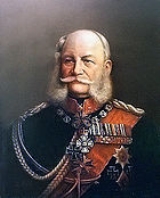
Lietuvininks we are born
Encyclopedia
Lietuvininkai we are born is a Lithuanian-language
patriotic and sentimental poem written by the German linguist Georg Sauerwein
in 1879. It is a passionate defense of Prussian Lithuanian (Lietuvininkai) language and culture, rallying people to resist Germanisation
attempts. However, at the same time the poem proclaimed love and loyalty to the Kaiser
signifying that the rally was cultural and not political. It was inspired by Enlightenment
ideas that archaic languages and traditions of minorities should be cherished, studied, and preserved. The poem was first published in the Prussian Lithuanian newspaper Lietuwißka Ceitunga
in 1879.
The poem was set to music in 1908 by the composer Stasys Šimkus
and became the unofficial anthem of Lithuania Minor
. Its shortened version using only the 1st and 4th stanzas relevant to both Lithuania Minor and Lithuania Major and replacing Lietuvininkai with Lietuviai (Lithuanians
), was proposed to become the National Anthem of Lithuania
after Lithuania established its nation state in 1918. Although it did not become the national anthem of the country, its popularity continued as a patriotic song which often could be heard during the Singing Revolution
. The musical theme of the song was used by the Lithuanian radio (before World War II), Sąjūdis
television programming, and news broadcast of Lithuanian National Radio
.
Lithuanian language
Lithuanian is the official state language of Lithuania and is recognized as one of the official languages of the European Union. There are about 2.96 million native Lithuanian speakers in Lithuania and about 170,000 abroad. Lithuanian is a Baltic language, closely related to Latvian, although they...
patriotic and sentimental poem written by the German linguist Georg Sauerwein
Georg Sauerwein
Georg Julius Justus Sauerwein Georg Julius Justus Sauerwein Georg Julius Justus Sauerwein (15 January 1831 in Hanover – 16 December 1904 in Christiania (now Oslo) was a German publisher, polyglot, poet, and linguist. He is buried at Gronau....
in 1879. It is a passionate defense of Prussian Lithuanian (Lietuvininkai) language and culture, rallying people to resist Germanisation
Germanisation
Germanisation is both the spread of the German language, people and culture either by force or assimilation, and the adaptation of a foreign word to the German language in linguistics, much like the Romanisation of many languages which do not use the Latin alphabet...
attempts. However, at the same time the poem proclaimed love and loyalty to the Kaiser
Kaiser
Kaiser is the German title meaning "Emperor", with Kaiserin being the female equivalent, "Empress". Like the Russian Czar it is directly derived from the Latin Emperors' title of Caesar, which in turn is derived from the personal name of a branch of the gens Julia, to which Gaius Julius Caesar,...
signifying that the rally was cultural and not political. It was inspired by Enlightenment
Age of Enlightenment
The Age of Enlightenment was an elite cultural movement of intellectuals in 18th century Europe that sought to mobilize the power of reason in order to reform society and advance knowledge. It promoted intellectual interchange and opposed intolerance and abuses in church and state...
ideas that archaic languages and traditions of minorities should be cherished, studied, and preserved. The poem was first published in the Prussian Lithuanian newspaper Lietuwißka Ceitunga
Lietuwißka Ceitunga
The Lietuwißka Ceitunga was an influential Lithuanian-language newspaper published for Prussian Lithuanians, an ethnic minority of East Prussia, a province of the German Empire...
in 1879.
The poem was set to music in 1908 by the composer Stasys Šimkus
Stasys Šimkus
Stasys Šimkus was a Lithuanian composer.Šimkus studied in Vilnius and Warsaw and later became the pupil of Anatoly Konstantinovich Lyadov, Jāzeps Vītols, and Maximilian Steinberg...
and became the unofficial anthem of Lithuania Minor
Lithuania Minor
Lithuania Minor or Prussian Lithuania is a historical ethnographic region of Prussia, later East Prussia in Germany, where Prussian Lithuanians or Lietuvininkai lived. Lithuania Minor enclosed the northern part of this province and got its name due to the territory's substantial...
. Its shortened version using only the 1st and 4th stanzas relevant to both Lithuania Minor and Lithuania Major and replacing Lietuvininkai with Lietuviai (Lithuanians
Lithuanians
Lithuanians are the Baltic ethnic group native to Lithuania, where they number around 2,765,600 people. Another million or more make up the Lithuanian diaspora, largely found in countries such as the United States, Brazil, Canada, Colombia, Russia, United Kingdom and Ireland. Their native language...
), was proposed to become the National Anthem of Lithuania
Tautiška giesme
Tautiška giesmė is the national anthem of Lithuania, also known by its opening words "Lietuva, Tėvyne mūsų" and as "Lietuvos himnas"...
after Lithuania established its nation state in 1918. Although it did not become the national anthem of the country, its popularity continued as a patriotic song which often could be heard during the Singing Revolution
Singing Revolution
The Singing Revolution is a commonly used name for events between 1987 and 1991 that led to the restoration of the independence of Estonia, Latvia and Lithuania...
. The musical theme of the song was used by the Lithuanian radio (before World War II), Sąjūdis
Sajudis
Sąjūdis initially known as the Reform Movement of Lithuania, is the political organization which led the struggle for Lithuanian independence in the late 1980s and early 1990s. It was established on June 3, 1988 and was led by Vytautas Landsbergis...
television programming, and news broadcast of Lithuanian National Radio
Lithuanian National Radio and Television
Lithuanian National Radio and Television is the national public broadcasting company of Lithuania. The company operates the two national public television channels LTV, LTV2 and LTV World . LRT also broadcasts three national public radio stations...
.

